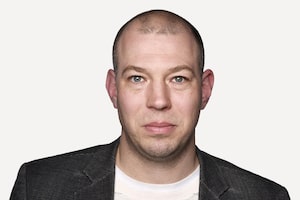Convicted sex offender Graham James, absent from the public eye since his pardon in 2007, as he appeared last week in Guadalajara, Mexico, when approached by reporters with CBC News and The Globe and Mail. His appearance has changed dramatically: he’s lost weight, has less hair and is greyer.CBC News/The Globe and Mail
With dozens of hungry patrons jostling for position at the El Super taco stand, and nuns weaving between double-parked cars, the retired hockey coach carrying a bag of dirty laundry blends neatly into the chaotic street scene.
If Graham James was looking for anonymity, he has found it in this city of six million people, Mexico's second largest. His slow, deliberate footsteps show no trace of panic - despite the political firestorm he has created in Canada, where it was recently revealed he obtained a behind-closed-doors pardon for hundreds of sexual assaults he committed on two teenage hockey players.
"I'm impressed that you found me," Mr. James said when approached last week by a team of journalists from The Globe and Mail and CBC, conducting a joint investigation. "But not that I've been hiding."
In April, it was publicly revealed that Mr. James had quietly obtained a pardon from the National Parole Board in 2007. The former junior hockey coach served a 3½-year prison sentence in the late 1990s, after he admitted to sexually assaulting two of his teenaged players more than 300 times.
The revelation of his pardon sparked an immediate outcry, most notably from Prime Minister Stephen Harper, who vowed to reform what the government has called a "rubber stamp" process. On Tuesday, the federal government introduced a bill that would forbid pardons from being issued to convicts who have committed three or more serious offences, as well as offenders who commit crimes against minors.
Amid the controversy, however, one question remained: Where was Mr. James?
The last time he publicly surfaced was shortly after his release from prison in 2000, when the media discovered he was coaching teenage hockey players in Spain. Recent press reports have suggested his last known whereabouts was Montreal.
A tip led CBC and The Globe to a ground-floor, single-bedroom apartment across the street from a brick-gated convent. Mr. James rents the apartment month-to-month, and spends most business days at home working for what is believed to be a Canadian-based Internet marketing company.
The former high-school English teacher and fiery coach - he once threw all his team's sticks and equipment onto the ice in a mid-game protest - has shed much of the chubbiness that defined his physical appearance more than a decade ago.
And while he repeatedly says that he believes he is a contributing member of Mexican society - "I've got a job, I'm working," he insists - he is less eager to address another storm on the horizon: an ever-expanding criminal investigation in Winnipeg. As many as four of his former teenaged players, including retired NHL star Theoren Fleury, have come forward to detectives in the past year to detail new allegations of sexual abuse.
"I have a lawyer already in Winnipeg, so it's not like I'm running away," Mr. James said, when asked if he would return to Canada to face any charges that might stem from the probe.
The 58-year-old would not reveal precisely when he arrived in Guadalajara, except to say, "I've been in Mexico long, long before any of this came out." Reporters from both news organizations surreptitiously watched Mr. James for about three days, during which he seldom left his apartment. There were no indications he was involved with coaching sports or working with youth.
His pardon didn't necessarily help him obtain a work permit in Mexico. There is nothing in a Mexican visa application that requires a newcomer to reveal his criminal record, said Alberto Lozano, the press officer for the Mexican embassy in Ottawa. Canada has an extradition treaty with Mexico, so there is nothing preventing authorities in Guadalajara from arresting Mr. James if Winnipeg police request his return.
Mr. James's criminal defence lawyer, Evan Roitenberg, said his client is in Latin America not to evade the law, but to escape notoriety.
"When individuals are of a certain profile, and they don't want to be in the public eye, they sometimes have to get out of the public eye. … I think it's as simple as that," Mr. Roitenberg said.
Sheldon Kennedy, the first of Mr. James's former players to publicly reveal he was a victim and whose statements to police led to the coach's 3½-year prison sentence, said there was a time when public sightings of his former coach would prompt sleepless nights. All of that has changed, he said.
"Graham doesn't have the power over me any more. There was a time when he still had that power, whether he was in Spain or wherever he was, and it really got to me," Mr. Kennedy said.
"My biggest concern is how we're going to help other guys coming out … and do the best we can to support them," said the former NHL winger, who has been in touch with some of the new complainants. "This is going to be the last crack that anybody's going to have to get Graham."
In an interview, Mr. Fleury said he couldn't comment on the status of the ongoing police investigation.
When a reporter described for him how Mr. James briefly trembled and stammered in response to a question about whether he would return to face the new accusations, the former Calgary Flames captain said: "Good. Good. Now he knows how we all felt."
With a report from Patrick White in Winnipeg
 Greg McArthur
Greg McArthur